Kovai Agro Farms Organic Spirulina is a blue-green micro-algae, this super food dates back over 3 billion years and is the most well known of these algaes. A potent nutrient-dense whole food, spirulina is over 60%-70% protein, and is a complete protein, supplying all eight essential amino acids. It is low in fat, but does contain vital essential fatty acids, including very high amounts of Gamma Linolenic Acid (GLA). GLA is a hormone precursor, and is found conducive to healthy heart functioning and circulation. It also has anti-inflammatory properties, which are beneficial for skin and hair.
Kovai Agro Farms & Spirulina, In the End of the 2019 and beginning of Covid-19, with the help of Dr.Prema, Dilip, Vidhubalu, Bharath And Jayavalu founder of Kovai Agro Farms founded a Simple vision of starting a spirulina farm in Kovai Agro Farms , Coimbatore. All collected a lot of info and did various laboratory scale experiments pertaining to spirulina production because its very important to have a nutrition Farm
Our Integrated production farm Model
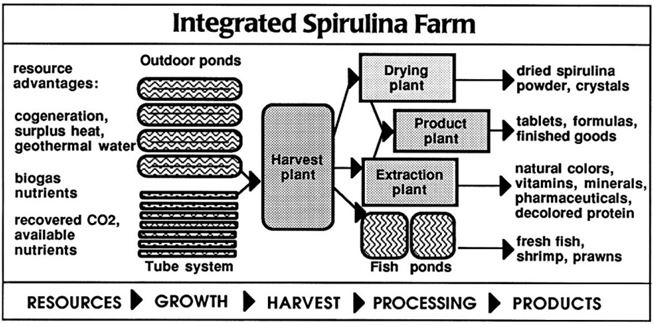
KOVAI AGRO FARMS ORGANIC SPIRULINA Integrated production farms
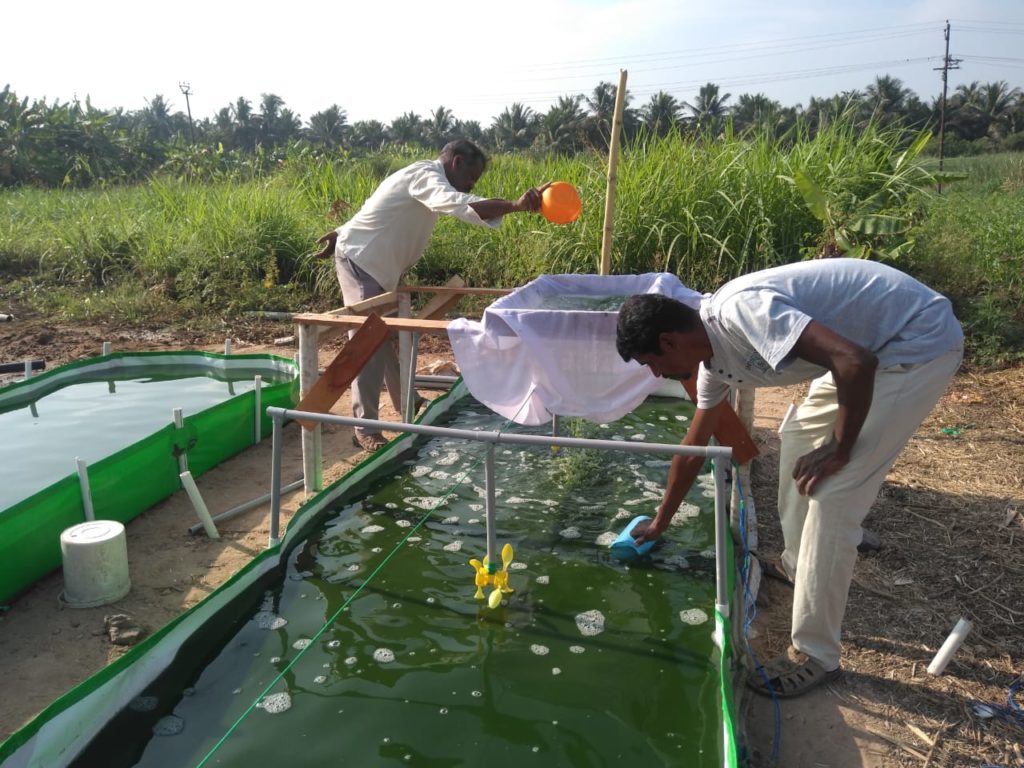
Kovai Agro Farms Organic Spirulina Harvesting plants 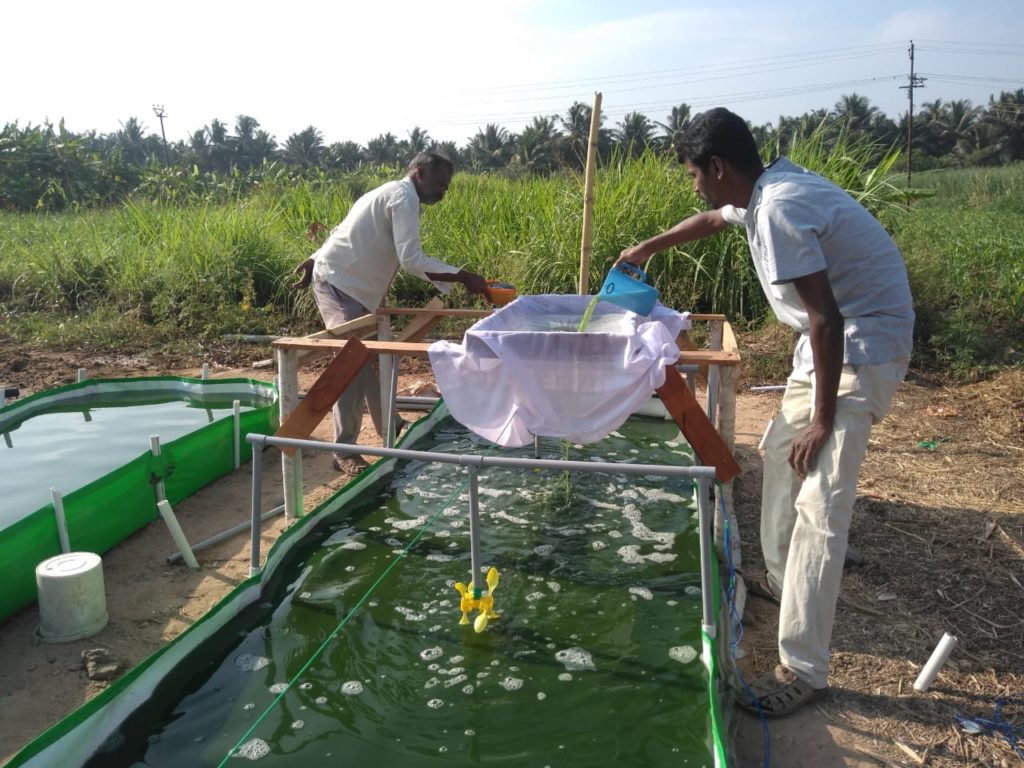
Kovai Agro Farms Organic Spirulina Harvesting plants 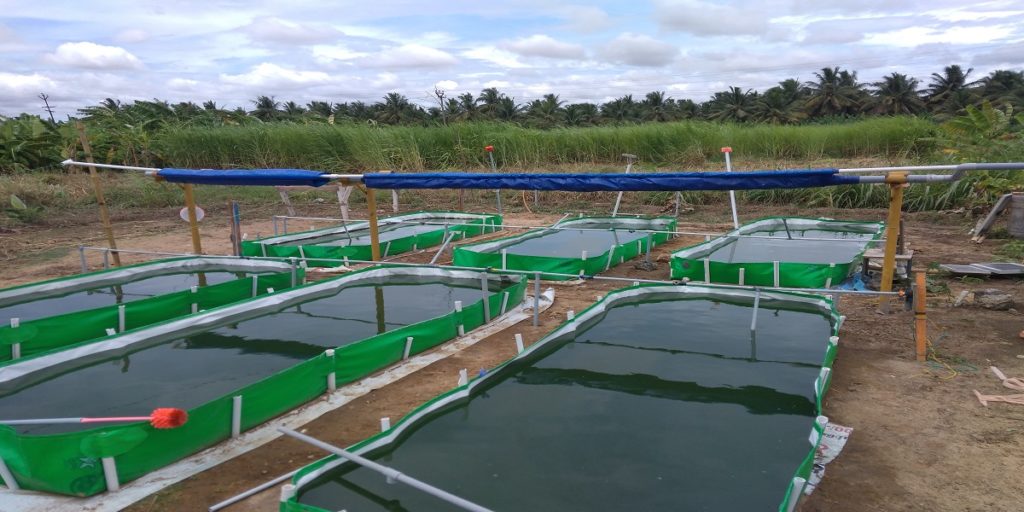
Organic Spirulina-Production-kovai-agro-farms
An Impressive Nutritional Profile
Spirulina called a superfood because its nutrient profile and unusual phytonutrients are more potent than any other food, plant, grain or herb.
Its 65% protein content is higher than any other natural food. Yet, an even greater value is found in its concentration of vitamins and minerals. Three to ten grams a day delivers impressive amounts of beta carotene, vitamin B-12 and B complex, iron, essential trace minerals and gamma-linolenic acid. Beyond vitamins and minerals, spirulina is rich in pigments, polysaccharies and other nutrients that benefit health.
For undernourished people in the developing world, spirulina brings quick recovery from malnutrition. In Western overfed food culture loaded with unhealthy and depleted foods, spirulina can renourish our bodies and renew our health.
It is legally approved as a food or food supplement in Europe, Japan and many other countries around the globe. The United States Food and Drug Administration confirmed in 1981 that spirulina is a source of protein and contains various vitamins and minerals and may be legally marketed as a food supplement. Spirulina has GRAS status (Generally Accepted as Safe).
Today’s food is lower in essential nutrients than foods produced 50 years ago. Farming practices have depleted our soils of minerals. Microorganisms in the soil contributing the valuable mineral content are declining because the overuse of chemical fertilizers destroys these microorganisms. At the same time, stress from environmental pollutants and lifestyle demands have increased dietary requirements for certain essential nutrients. Today, at least some supplements are used by almost everyone.
Most people believe it is better to get nutrients from natural foods. Since many conventional foods are nutrient depleted, more people are taking spirulina and green superfoods. These whole foods offer functional nutrients, new frontiers for disease prevention research, way beyond isolated vitamin and mineral supplements.
Digestible protein and amino acids, low fat and calories
Spirulina has the highest protein of any natural food (65%); more than animal and fish flesh (15-25%), soybeans (35%), dried milk (35%), peanuts (25%), eggs (12%), grains (8-14%) or whole milk (3%).
Spirulina cell walls are composed of soft mucopolysaccharides, making it easily digested and assimilated, especially important for people suffering from intestinal malabsorption. Typically, many older people have difficulty digesting complex proteins,and are on restricted diets. They find spirulina’s protein easy to digest. Spirulina is effective for victims of malnutrition diseases like kwashiorkor, where intestinal absorption has been damaged.
Spirulina’s fat content is only 5%, far lower than almost all other protein sources. Ten grams has only 36 calories and virtually no cholesterol. This means spirulina is a lowfat, low-calorie, cholesterol-free source of protein.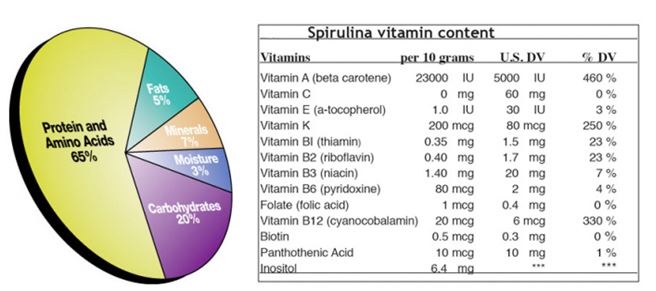
KOVAI AGRO FARMS SPIRULINA Potent vitamins, protectors of health
Potent vitamins, protectors of health
Beta Carotene. Spirulina is the richest beta-carotene food, ten times more concentrated than carrots. Ten grams provide 460% of the U.S. Daily Value (DV) of Vitamin A. Human bodies convert beta carotene to Vitamin A only as needed. Vitamin A deficiency is one of the most serious malnutrition diseases in the developing world, leading to blindness.
Beta carotene has therapeutic effects, including reducing serum. Cancer health authorities have published studies showing beta carotene may reduce risks of all kinds of cancers. Since increase in cancer rates seems to be caused by environmental factors, especially diet, these risks can be reduced by increasing protective factors, especially beta carotene, in the diet.
Spirulina contains an antioxidant complex of ten carotenoids. These mixed carotenes and xanthophylls function at different sites in the body and work synergistically with the other essential vitamins, Vitamin E, minerals and phytonutrients in spirulina. Even if you don’t eat the recommended 4 to 9 servings of fruits and vegetables every day, get natural carotenoid antioxidant protection from spirulina every day.
Vitamin B-12 and B-complex vitamins. Spirulina is the richest source of B-12, higher
than beef liver, chlorella or sea vegetables. B-12 is necessary for development of red blood cells, especially in the bone marrow and nervous system. Although primary B-12 deficiencies, pernicious anemia and nerve degeneration, are quite rare, because B-12 is the most difficult vitamin to get from plant sources, vegetarians have taken to spirulina.
Ten grams contain 20 mcg of Vitamin B-12, 330% DV, using microbiological assay. There has been scientific controversy over the methodology used to measure Vitamin B-12 and its analogs. Yet, in 30 years, there have been no complaints of a vitamin B-12 deficiency from spirulina consumers, including children and vegetarians.
One tablespoon provides significant quantities of thiamin (23% DV), riboflavin (23% DV) and niacin (7% DV). Spirulina is a richer source of these vitamins than common whole grains, fruits and vegetables and some seeds. Other B vitamins, B-6, niacin, biotin, panthothenic acid, folic acid, inositol and Vitamin E are also present in smaller amounts.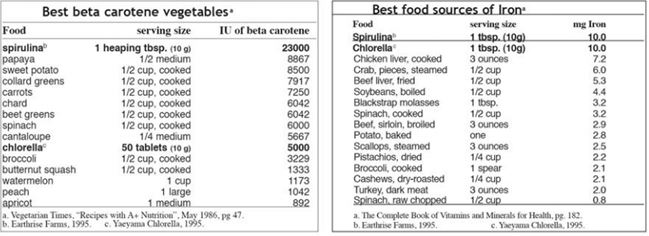
KOVAI AGRO FARMS SPIRULINA Vitamin B-12 and B-complex vitamins
Naturally colloidal minerals
Algae absorb trace minerals while growing and these are well assimilated by the human body. Its mineral content depends on where it is grown and the minerals in the water. The best natural iron supplement. Iron is the most common mineral deficiency worldwide, especially for women, children and older people. Women on weight loss diets typically do not get enough iron, and can become anemic. Iron is essential for strong red blood cells and a healthy immune system.
Spirulina is a rich iron food, 10 times higher than common iron foods. Ten grams can supply up to 10 mg of iron, 55% RDV. Spirulina iron is easily absorbed. It is theorized that its blue pigment, phycocyanin, forms soluble complexes with iron and other minerals during digestion making iron more bioavailable. Hence, iron in spirulina is over twice as absorbable as the form of iron in vegetables and most meats and 60% better absorbed than iron supplements such as iron sulfate.
Calcium, magnesium, zinc and trace minerals. Spirulina is a concentrated calcium food, supplying more, gram for gram, than milk. Ten grams supply 7% DV for calcium. Calcium is important for bones and neural transmissions to the muscles and deficiencies can lead to osteoporosis in older women. Ten grams supply 10% DV for magnesium, one of the most concentrated magnesium foods. Magnesium facilitates absorption of calcium and helps regulate blood pressure. Spirulina is low in sodium, and is no problem for those on salt-restricted diets.
Humans need dozens of essential trace minerals for the functioning of enzyme systems and many other physiological functions. Deficiency of trace minerals in the typical diet are thought to be widespread. Ten grams supply manganese (25% DV), chromium (21% DV), selenium (14% DV), copper (6% DV) and zinc (2% DV).
Essential fatty acids
Humans require dietary essential fatty acids (EFA). Spirulina has 4 to 7% lipids, and most of these are essential fatty acids. Ten grams have 225 mg of EFA as linoleic and gamma-linolenic acid (GLA). Ten grams provide 8 to 14% DV, depending on sex and age group. 16 GLA is the precursor to the body’s prostaglandins – master hormones that control many functions. Dietary saturated fats and alcohol can cause in GLA deficiency and suppressed prostaglandin formation. Studies show GLA deficiency figures in many diseases and health problems, so a food source of GLA can be important. The other known sources of dietary GLA are mother’s milk and oil extracts of evening primrose, black currant and borage seeds.
KOVAI AGRO FARMS SPIRULINA Essential fatty acids
A rainbow of pigments and phytonutrients
These functional nutrients have no Recommended Daily Value, but are known to benefit health. They include pigments and polysaccharides. Pigments help synthesize enzymes necessary for regulating the body’s metabolism. Spirulina’s dark color comes from natural pigments that harvest different wave lengths of sunlight.
Phycocyanin (algae-blue). This protein complex is about 14% of spirulina. Phycocyanin evolved a billion years before chlorophyll and may be the precursor to chlorophyll and hemoglobin. Much research suggests it stimulates the immune system.
Chlorophyll (nature’s green magic). Chlorophyll is known for cleansing and detoxifying. Sometimes called ‘green blood’ because it looks like the hemoglobin molecule in human blood. Spirulina’s beneficial effect on anemia could be due to this similarity of chlorophyll and hemoglobin and its high bioavailable iron. Spirulina has 1% chlorophyll, one of nature’s highest levels, and Chlorella has 2 to 3%.
Carotenoids (natural antioxidants). About half of the yellow/orange pigments in spirulina are carotenes: Alpha, Beta and Gamma. About half are xanthophylls. Although beta carotene is best known, this mixed carotenoid complex functions at different sites in the body and works synergistically to enhance antioxidant protection.
Polysaccharides. Spirulina contains 15 to 25% carbohydrate and sugar. The primary forms of carbohydrates are rhamnose and glycogen, two polysaccharides easily absorbed by the body with minimum insulin intervention. Spirulina offers quick energy, without taxing the pancreas or precipitating hypoglycemia.
Glycolipids and Sulfolipids. When NCI announced that sulfolipids in blue-green algae were ‘remarkably active’ against the AIDS virus, attention was focused on the sulfolipid containing glycolipids. 40% of the lipids are glycolipids and sulfolipids range from 2-5%.
Health benefits beyond the nutritional profile
For over 30 years, people have reported heath benefits from small daily supplements of algae, like spirulina. The nutritional profile of algae protein, vitamins and minerals, however impressive, does not fully account for these therapeutic results. But a remarkable body of published scientific evidence has been accumulating from around the world, explaining how as little as 3 to 5 grams of spirulina per day, one teaspoon or 10 tablets, can be effective in supplying some extraordinary health benefits.
1.4. Scientific Research Reveals Health Benefits
An international detective hunt has been underway for 40 years. Researchers in Japan, China, India, Europe, USA and other countries are discovering how and why this algae is effective for human and animal health.
Hundreds of published and reviewed scientific studies have focused on spirulina – how this food, its phytonutrients and extracts boost the immune system and improve health. A more complete scientific bibliography and reference guide is available in the book Spirulina Whole Food and at SpirulinaSource.com. The following summary briefly touches on some important areas of research and findings that spirulina:
- Stimulates the immune system.
- Increases anti-viral activity.
- Offers anti-aging and neuroprotective benefits.
- Reduces risk of cancer.
- Reduces kidney toxicity.
- Builds healthy lactobacillus.
- Overcomes malabsorption and malnutrition.
- Improves wound healing.
- Reduces radiation sickness.
Supports immune system for people over 50: New research continues to be announced. A UC Davis study will be published in the March 2011 Journal of Cellular & Molecular Immunology, “The effects of Spirulina on anemia and immune function in senior citizens.” The report suggests taking spirulina as a supplement may improve immune function and ameliorate anemia in persons over 50.
Anti-viral activity. There are peer reviewed scientific studies about spirulina’s ability to inhibit viral replication, strengthen the immune system and cause regression and inhibition of cancers.
U.S. scientists announced preliminary research, documenting that a water extract of spirulina inhibits HIV-1 replication in human derived T-cells and in human blood mononuclear cells. Small amounts of the extract reduced viral replication, while higher concentration totally stopped its reproduction. The extract seemed to prevent the virus from penetrating the cell membrane, therefore the virus was unable to replicate.
In 1989, the NCI announced that chemicals from blue-green algae were found to be “remarkably active” against the AIDS virus. These are the naturally occurring sulfolipid portions of the glycolipids. Sulfolipids can prevent viruses from either attaching to or penetrating into cells, thus preventing viral infection.
Anti-cancer effects. Studies show beta carotene rich spirulina or its extracts prevent or inhibit cancers in humans and animals. Some common forms of cancer are thought to result from damaged cell DNA causing uncontrolled cell growth. In a US study, spirulina extracts reduced oral cancer cells. A beta carotene solution applied to cancerous tumors in mouths of hamsters reduced the number and size of tumors or caused them to disappear. In India, spirulina reversed oral cancer in pan tobacco chewers in Kerala. An Israeli study showed natural beta carotene is more effective than synthetic.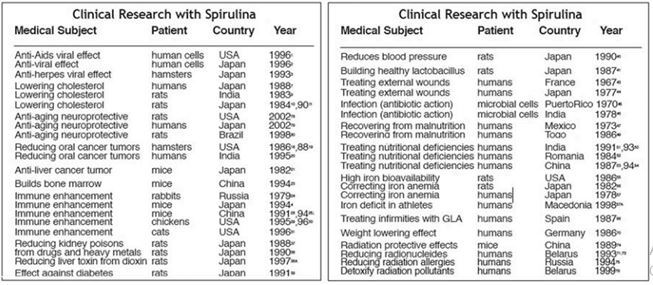
KOVAI AGRO FARMS SPIRULINA Anti-cancer effects
Strengthens the immune system. Spirulina is a powerful tonic for the immune system. In studies of mice, hamsters, chickens, turkeys, cats and fish, it improves immune system function. It not only stimulates the immune system, it enhances the body’s ability to generate new blood cells. Spirulina upregulates key cells and organs, improving their ability to function in spite of stresses from environmental toxins and infectious agents.
Anti-aging and neuroprotective effects. Multiple studies suggest spirulina should be considered therapeutic intervention for the aging brain. Many beneficial outcomes of spirulina could be linked to the activation of the innate immune system, first line of defense in our bodies. The inflammation seen with normal aging can be down regulated with spirulina, as seen by the benefits of spirulina administration in arthritis. Spirulina has actions in the central nervous system to counterract oxidative stress and inflammation that occur as a consequence of aging and to aid regeneration of the brain following injury or neurodegenerative disease.
Reduces kidney and liver toxicity from mercury, drugs and chemical pollutants. Kidneys play an essential role in cleansing the body of toxins. Scientists are interested in substances that can help cleanse the kidneys of toxic side effects from heavy metal poisoning or from high intake of medicines or pharmaceutical drugs. In Japan, studies with rats suggest spirulina phycocyanin extract may have a beneficial effect for humans suffering from heavy metal poisoning.
Phycocyanin enhances the immune system. Research in Japan suggests phycocyanin raises lymphocyte activity and acts by strengthening the body’s resistance through the lymph system. Phycocyanin may be active in preventing degenerative organ diseases by boosting immunity. A Japanese patent states a small dosage of phycocyanin daily maintains or accelerates normal control cell functions that prevents generation of malignancy such as cancer or inhibits its growth or recurrence.
Polysaccharides enhance the immune system. In 1979, Russian scientists published initial research on the immune stimulating effects on rabbits from lipopolysaccharides in spirulina. More recent studies in China and Japan have shown polysaccharide extracts increased macrophage function, antibody production and infection fighting T-cells.
Phycocyanin builds blood. Studies show phycocyanin in spirulina affects the stem cells found in bone marrow. Stem cells are “grandmother” to both the white blood cells that make up the cellular immune system and red blood cells that oxygenate the body. Chinese scientists document Phycocyanin stimulating hematopoiesis (the creation of blood), regulating production of white blood cells, even when bone marrow stem cells are damaged by toxic chemicals or radiation.
